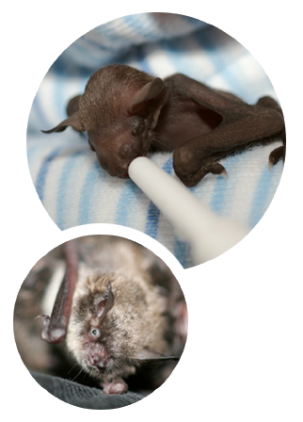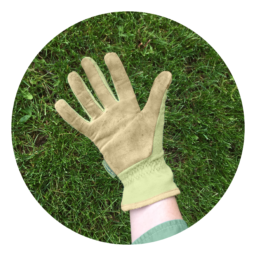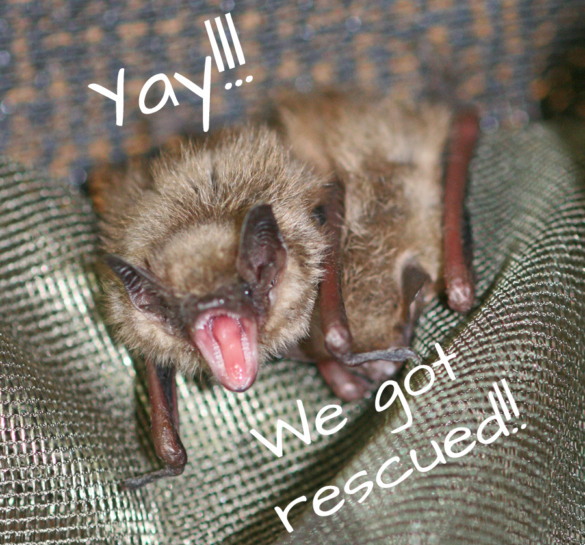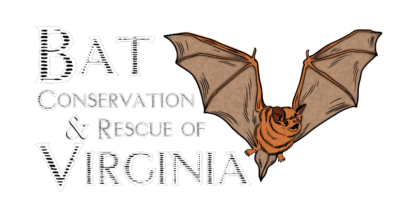Bat Rescue
Learn what to do if a bat needs help

Safely reuniting bat pups
In Virginia, Mid-May through August is bat maternity season. If you find a bat pup you think needs help and that has not bitten or scratched a person or domestic animal, please read this guide to reunite it with its mother.MOM IS ALWAYS BEST!
Occasionally, overheating causes a colony to jostle for the coolest spots and pups get dislodged and fall out, or a predator gets in and causes a disruption. In 'natural' colony spaces, pups can climb back into the colony and reunite with mothers. However, building and bat box colonies often leave no way for fallen pups to return. If you find pups down under a known colony you can return them using a pool skimmer. If pups continue to fall, pup catchers often solve the problem.
But sometimes a mother bat does not return to the colony. Pups that are thin and dehydrated or that are found wandering are probably orphans and can be rehabilitated by trained wildlife rehabilitators.
Adult bats can get in trouble and sometimes need rescue. Grounded bats are not always sick - they get hit by cars, blown into walls, dropped by predators, get too cold or wet, get torn or broken wings, get trapped in buildings, etc., etc. If no one has been bitten and if potential rabies exposure is ruled out, injured and displaced bats can also go to qualified rehabilitators.

If you find a bat in need of help in Virginia, here are your local resources:
- Fairfax County VA: Please call Animal Protection Police first at 703-691-2131 or call Kim O'Keefe at 703-627-9975
- Arlington County VA: Please call Animal Welfare League of Arlington 703-931-9241; leave a message even if they are not open as calls are routed to Animal Officers immediately. Otherwise, please call Kim O'Keefe at 703-627-9975
- We have additional help available for the Woodbridge and Stafford areas. Please leave a message with Kim O'Keefe so calls can be routed appropriately
- Other areas of Northern Virginia: Please text AERO Animal Education and Rescue Organization at (703) 493-0554
- Far northern Virginia: please call Wildlife Veterinary Care 540-664-9494 or Blue Ridge Wildlife Center 540-837-9000
- Rockingham or Augusta County: please call Bat Conservation & Rescue of Virginia Headquarters at 703-973-3157
- Roanoke and surrounding areas: Southwest Virginia Wildlife Center of Roanoke 540-798-9836
- In Montgomery or Prince Georges counties in Maryland: call Second Chance Wildlife Center 301-926-9453
- In the Baltimore region in Maryland: please call Phoenix Wildlife Center 410-628-9736
For other regions in Virginia, please visit the Virginia Department of Wildlife Resources website for a list of permitted wildlife rehabilitators by county, or use the great phone app or website from Animal Help Now.
Bat World Sanctuary maintains a national list of bat helpers; click here for more information.
Bat rescue is for adults only. Please find an adult to help with any bat. Please do not touch the bat!
Please do not handle bats with bare hands or allow children or pets access to bats or other wildlife.

IMPORTANT INFORMATION REGARDING:
COVID-19 AND BATS OF VIRGINIA

As of May 5, 2021, All species of bats may be rehabilitated as per the director of the Virginia Department Wildlife Resources (VDWR)
If you have found a bat:
- Avoid touching any bats for any reason if you are infected with COVID-19 or have been potentially exposed to the virus.
- If you are not known to be infected with or exposed to COVID-19, only move bats if you can do so without coming into direct contact with the bat -- wear sturdy gloves and use a cloth or large plastic cooking spoon to gently move bats. Be aware that any contact with the saliva or brain or spinal cord tissue of the bat constitutes a potential rabies exposure and must be reported to your county health department.
- Minimize any contact with wild animals. Once the animal is secure and ready for transport to a rehabilitator, hands off! Put the box in a secure location, like an unused guest bathroom or storage closet and leave it alone until ready to transport or help arrives.
- Before securing the animal take a clear photograph of the animal and its surroundings/location. This helps a rehabilitator assess if the animal is in immediate danger or if it may not need rescue at all.
Facts:
- North American bats do not have or 'carry' COVID-19.
- ONE bat species in China was found to have a corona virus that has DNA which is ~97% similar to SARS-COV2 (the technical name of the COVID-19 virus). By comparison, human DNA is ~99% similar to that of bonobos and chimpanzees, so a small percentage of difference can mean a great deal.
- There are 1,400 species of bats globally, which fall under a large number of genera. The species of bat in which the genetically similar virus was found is is a species horseshoe bat, genus rhinolophus, which is not closely related to any North American bat species.
- Laboratory studies have shown that SARS-type coronaviruses can attach to lung tissue of native North American bats, but no studies to date have shown that the virus can cause disease or be passed to other bats and circulate in populations.
Copyright © 2021 Bat Conservation & Rescue of Virginia. All rights reserved.
